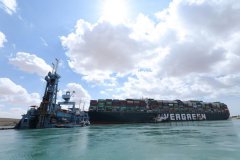Around 3,000 Moroccan migrants cross into Spanish territory
Authorities in Spain say around 3,000 Moroccans, 1,000 of whom are presumed to be minors, crossed into the Spanish northern African enclave of Ceuta
May 17, 2021, 7:59 PM
5 min read
Share to FacebookShare to TwitterEmail this articleA woman from Morocco arrives at the beach after swimming crossing into the Spanish territory, near the border of Morocco and Spain at the Spanish enclave of Ceuta on Monday, May 17, 2021. Authorities in Spain say that around 1,000 Moroccan migrants have crossed into Spanish territory (Antonio Sempere/Europa Press via AP)
MADRID -- Around 3,000 Moroccans, a third of whom were presumed to be minors according to Spanish authorities, swam and used inflatable boats Monday to cross into Ceuta, the largest number of migrant arrivals in a single day into Spain's enclave in northern Africa.
A young male drowned attempting the crossing and various others, including toddlers, were rescued suffering from hypothermia, health authorities said.
The influx followed the souring of Spain's relations with Morocco, its southern partner and key ally on controlling migration flows, over Madrid's decision to allow the leader of a militant group fighting for independence from Morocco to receive hospital treatment.
Ceuta and nearby Melilla are regarded as a stepping stone into Europe for African migrants. Hundreds of them risk injuries or death every year while trying to jump over fences, hide inside vehicles or by swimming around breakwaters that extend several meters into the Mediterranean Sea.
But the figure of 3,000 people making the crossing in just one day strained police and emergency workers in the city of 84,000. The figure is nearly three times the total arrivals so far this year in the two Spanish territories and more than in 2020, when 2,228 people arrived by both land and sea.
Footage published by El Faro de Ceuta, a local newspaper, showed people climbing the rocky wall of the breakwaters and running across the Tarajal beach, in the southeastern end of the city.
Other videos verified by The Associated Press showed long rows of young men lining up at the gates of a warehouse managed by the local Red Cross, waiting to get registered by Spanish Civil Guard officers.
Spain was deploying 200 more law enforcement officers to Ceuta, including anti-riot police and officers specialized in border control to speed up the return of those who arrived, the Interior Ministry said in a statement late Monday. Spain doesn’t grant Moroccans asylum status. It only allows unaccompanied migrant children to legally remain in the country under the government’s supervision.
The influx of Moroccans came at the end of the Muslim celebrations of Ramadan, when many residents in Europe return home after visiting relatives in the northern African country. It also followed Madrid's decision to host Brahim Ghali, the head of the Polisario Front that disputes Rabat's claim on Western Sahara, who is recovering from COVID-19 in a hospital in northern Spain.
The Spanish government, which allowed Ghali to enter the country under a disguised identity, has justified its decision to give him shelter on humanitarian grounds.
The Moroccan foreign ministry said last month that Madrid's move was “inconsistent with the spirit of partnership and good neighborliness.” In May, the ministry also said that Spain's move would have “consequences.”
Mohammed Ben Aisa, head of the Northern Observatory for Human Rights, a nonprofit group that works with migrants in northern Morocco, said that the influx was a mix of the seasonal attempts to reach Europe, the arrival of good weather and the recent tensions between Rabat and Madrid.
“The information that we have is that the Moroccan authorities reduced the usually heavy militarization of the coasts, which come after Morocco’s foreign ministry statement about Spain’s hosting of Brahim Ghali," Ben Aisa told The Associated Press.
“The area is heavily monitored by security forces and attempts there, whether to climb the fence or swim, are usually stopped," he added.








